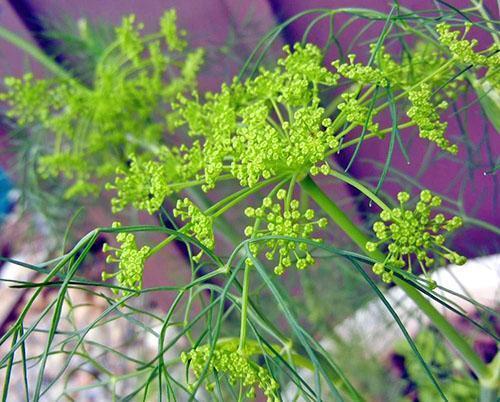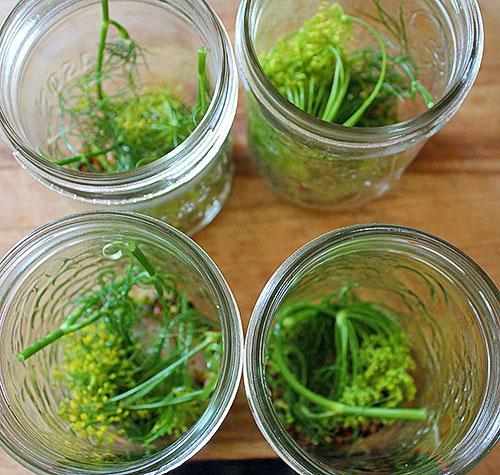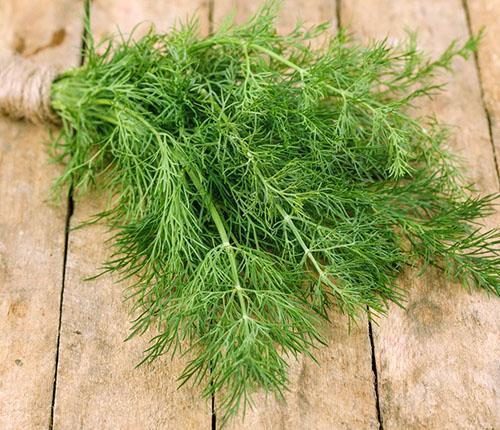The benefits and harms of dill for human health
 Garden dill, well-known to people for more than one thousand years, is used in the cuisines of various countries and regions. The plant in the form of extracts, decoctions and fragrances is used in cosmetology, but dill greens are in no less demand in medicine. The inhabitants of Hellas and Ancient Rome also used dill as a natural pain reliever. Today, thanks to a detailed study of the composition of the herb, its application can be much wider.
Garden dill, well-known to people for more than one thousand years, is used in the cuisines of various countries and regions. The plant in the form of extracts, decoctions and fragrances is used in cosmetology, but dill greens are in no less demand in medicine. The inhabitants of Hellas and Ancient Rome also used dill as a natural pain reliever. Today, thanks to a detailed study of the composition of the herb, its application can be much wider.
So what are the beneficial properties of dill, and are there any contraindications when using spicy herbs in food? Throughout the summer, dill greens from the beds fall on the table, fresh foliage is harvested for the winter. Can everyone add chopped dill sprigs to soups and salads? And how is dill good for the body?
Composition and calorie content of dill

The aroma of dill is due to the abundance of essential oils, but this is not the only advantage of the plant.
For 100 grams of greens containing only 38 kcal, you have:
- 0.5 grams of fat;
- 2.5 grams of protein;
- 6.3 grams of carbohydrates.
What is useful for the body dill, and what diseases can it relieve? The first in the line of vitamins found in dill is ascorbic acid. When eating 100 grams of fresh herbs per day, a person receives more than 110% of the required amount of vitamin C.
 In addition, dill contains beta-carotene, tocopherol and B vitamins. The macronutrient composition of dill greens includes copper, potassium and sodium, magnesium, zinc and other vital substances necessary for a person. Dill in a salad or stew will replenish the body with iron and phosphorus, and the active substances of dill will have a disinfecting, soothing and analgesic effect.
In addition, dill contains beta-carotene, tocopherol and B vitamins. The macronutrient composition of dill greens includes copper, potassium and sodium, magnesium, zinc and other vital substances necessary for a person. Dill in a salad or stew will replenish the body with iron and phosphorus, and the active substances of dill will have a disinfecting, soothing and analgesic effect.
How is dill useful for the body?
 What are the benefits and harms of dill for the body? For what diseases will the use of greens and dishes from it have a beneficial effect, and when is it better to refuse a branch of dill?
What are the benefits and harms of dill for the body? For what diseases will the use of greens and dishes from it have a beneficial effect, and when is it better to refuse a branch of dill?
Essential oils in dill greens are not only responsible for its aroma, but also promote the activation of digestive processes.
Due to this, food such as fatty meat, which is heavy for the stomach, is digested and absorbed by the body much easier and faster in the presence of dill. What are the benefits of dill for the body? Phytoncides that have a disinfecting effect in combination with ascorbic acid and other active substances serve:
- suppression of pathogenic flora in the body;
- increasing resistance to intestinal infections;
- maintaining immunity against seasonal colds.
Dill broth is used for dyspepsia and even, according to some experts, prevent the development of cancer cells.
The slight antispasmodic effect of dill on the body is useful for respiratory diseases, for example, colds and allergic coughs and sneezes. In addition, the essential oil of this plant has antihistamine properties and can relieve the suffering of allergy sufferers. For women, dill is good for painful periods. Dishes flavored with herbs and an infusion taken for medicinal purposes will help:
- relieve pain;
- reduce spasms.
 In the greens of dill, which is useful for the body, besides other vitamins and trace elements, there is enough calcium, which is indispensable for the health of the skeletal system. Therefore, for people of mature and old age, spicy herbs can serve as a good preventive measure against osteoporosis. At any age, dill promotes healing of fractures, bruises and cracks.
In the greens of dill, which is useful for the body, besides other vitamins and trace elements, there is enough calcium, which is indispensable for the health of the skeletal system. Therefore, for people of mature and old age, spicy herbs can serve as a good preventive measure against osteoporosis. At any age, dill promotes healing of fractures, bruises and cracks.
Flavonoids in dill and numerous B vitamins perfectly tone up, normalize mental and nervous activity.
Dill sprig:
- quietly relieve the feeling of anxiety;
- help to overcome fatigue after a working day;
- will help to recover from illness.
The herbal remedy is safe and gentle to normalize blood pressure. Dill can both effectively soothe and invigorate at the right time. The effect of a decoction of dill and fresh foliage also extends to sexual functions, which is why dill is useful for men, whose hormonal fund is reduced due to age-related changes or diseases. The herb has a similar effect on women.
Ways to use dill for recovery
 Fragrant fresh dill is an irreplaceable seasoning for salads, marinades and hot dishes. Culinary experts prefer to deal with herbs, and graceful umbrellas with seeds are used only in homemade preparations. But useful substances are in all parts of the plant, therefore, green leaves, stems, and plant seeds are suitable for the preparation of medicinal infusions, decoctions, oils and extracts. Such dill products have a lot of useful properties and there are almost no contraindications.
Fragrant fresh dill is an irreplaceable seasoning for salads, marinades and hot dishes. Culinary experts prefer to deal with herbs, and graceful umbrellas with seeds are used only in homemade preparations. But useful substances are in all parts of the plant, therefore, green leaves, stems, and plant seeds are suitable for the preparation of medicinal infusions, decoctions, oils and extracts. Such dill products have a lot of useful properties and there are almost no contraindications.
In terms of the amount of essential oils, it is the seeds that are in the lead, which in the form of infusions and decoctions have long been considered an effective remedy for gas formation, headaches and inflammatory processes of the urogenital organs.
At home, the easiest way is to prepare an infusion from seeds and shoots of dill, as well as prepare a healing decoction from this plant:
- For infusion, a teaspoon of dry seeds and pour a glass of boiling water.
- After 30 minutes, a mild pain reliever and sedative can be taken twice a day, 100–120 ml.
A strengthening tonic decoction from dill, useful for the body, is made from two tablespoons of dry seeds or chopped plant materials, apple and orange peel, a small amount of raspberry or currant leaves:
- The dry mixture is brewed with a liter of boiling water and kept on fire for about 10 minutes.
- When the product has cooled down, the liquid is filtered and taken in the morning and evening, 150-200 ml.
 Since all the active properties of plants are transferred to such infusions, it is better to consult a specialist before taking the funds. But the external remedies from dill have useful properties, and practically have no contraindications, therefore they will definitely not cause harm. But gruel made from chopped greens will help relieve swelling and itching after an insect bite. A compress with such a simple composition draws pus from neglected wounds and relieves inflammation.
Since all the active properties of plants are transferred to such infusions, it is better to consult a specialist before taking the funds. But the external remedies from dill have useful properties, and practically have no contraindications, therefore they will definitely not cause harm. But gruel made from chopped greens will help relieve swelling and itching after an insect bite. A compress with such a simple composition draws pus from neglected wounds and relieves inflammation.
Dill is well known to cosmetologists as a moisturizing agent that relieves fatigue and skin inflammation.
Masks and compresses, which include crushed greens, lighten age spots, tighten and saturate the skin of the face, neck and hands with vitamins. Such procedures are especially useful in winter, when the body is naturally deficient in vitamins. And here ice cubes made of dill will come to the rescue, which is useful for the body from this side.
Contraindications when using dill
 Despite the excellent set of useful qualities and the vitamin composition of dill, it is by no means impossible to use this plant thoughtlessly and uncontrollably. The benefits of dill and the harm to health that are possible with the passion for self-medication with this plant depend on the doses and methods used.
Despite the excellent set of useful qualities and the vitamin composition of dill, it is by no means impossible to use this plant thoughtlessly and uncontrollably. The benefits of dill and the harm to health that are possible with the passion for self-medication with this plant depend on the doses and methods used.
With reduced pressure, excessive amounts of dill on the menu only aggravate the situation and can cause fainting.
There is also an individual intolerance to dill essential oils.If dill is a new herb in the diet, it is better to start using it with a small portion, and at the first sign of an allergic reaction, you will have to refuse the greens.
I never thought that dill helps so well against cystitis, but then my urinary tract became inflamed, I went to the urologist - I said to drink Monural and drink a decoction of dill and cranberry juice. As a result, I was cured without health losses, which made me very happy.
I was also told to drink dill broth after monural, but I did not understand - should the seeds be brewed or leaves? Does it matter or not?
For the preparation of decoctions, dill seeds are used (sometimes umbrellas are added). They contain the bulk of nutrients. The leaves are used as a seasoning and addition to salads. Umbrellas and stems are used for conservation.